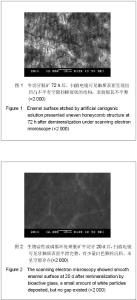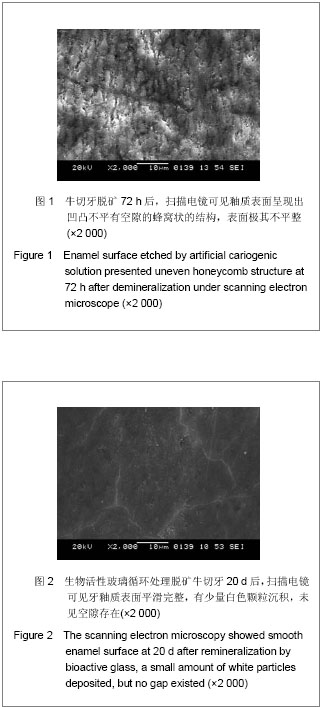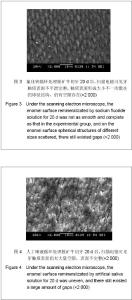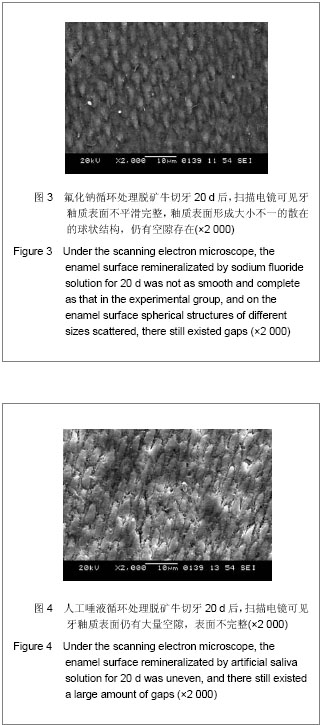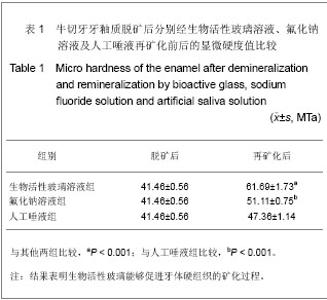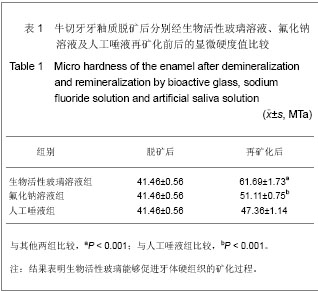| [1] Fan MW,Bian Z.Beijing:Renmin Weisheng Chubanshe.2003.樊明文,边专.龋病学[M].北京:人民卫生出版社,2003.[2] Fan MW,Zhou XF. Beijing:Renmin Weisheng Chubanshe. 2008: 4.樊明文,周学东.牙体牙髓病学[M].3版.北京:人民卫生出版社, 2008: 4.[3] Wang JD,Gao XJ. Beijing:Beijing Daxue Yixue Chubanshe. 2006.王嘉德,高学军. 牙体牙髓病学[M].北京:北京大学医学出版社, 2006.[4] Hench LL. The story of Bioglass. J Mater Sci Mater Med.2006; 17(11):967-978.[5] Walsh LJ.Contemporary technologies for remineralization therapies: A review. Inter Dent Sa.2009;4(4):34-46.[6] Wilson J,Pigotl GH,Schoen FJ,et al. Toxicology and biocompatibility of bioglasses. J Biomed Mater Res.1981; 15(6):805.[7] Price N,Bend all SP,Froncloza C,et al. Human osteoblast-like-cells (MG63) proliferate on a bioactive glass surface. J Biomed Mater Res.1997;37(3):394.[8] Stoor P,Kirstila V,Soderling E,et al.Interactionsbetween bio-active glass S53P4 and periodontal pathogens. Microb Ecol Health Dis.1996;9:109-114.[9] Allan I,Newman H,Wilson M.Antibacterial activity of particulate bioglass against supra- and subgingival bacteria. Biomaterials.2001;22(12):1683-1687.[10] Lovelace TB,Mellonig JT,Meffert RM,et al. Clinical evaluation of bioactive glass in the treatment of periodontal osseous defects in humans.J Periodontol.1998;69(9):1027-1035.[11] Du MQ,Tai BJ,Jiang H,et al.Kouqiang Yixue Yanjiu. 2004; 20(6): 641-643.杜民权,台保军,江汉,等.含Novamin生物活性材料的牙膏抗牙本质过敏的临床试验[J].口腔医学研究,2004,20(6):641-643.[12] Gillam DG,Mordan NJ,Newman HN. The dentin disc surface:a plausible model for dentin physiology and dentin senditivity eval-uation.Adv Dent Res.1997;11(4):487-501.[13] Wilson J,Low SB.Bioactive ceramics for Periodontal treatment: compara-tive studies in the patus monkey. J Appl Biomater. 1992;3(2):123.[14] Xynos ID,Edgar AJ,Buttery LD,et al.Gene-expression profiling of human osteoblasts following treatment with the ionic products of Bioglass 45s5 dissolution.J Biomed mater Res. 2001;5(2):151-157.[15] Hoppe A,Guldal NS,Boccaccini AR.A review of the biological response to ionic dissolution products from bioactive glasses and glass-ceramics. Biomaterials.2011;32(11): 2757-2774.[16] Kirk JF,Ritter G,Waters C,et al. Osteoconductivity and osteoinductivity of NanoFUSE(®) DBM. Cell Tissue Bank. 2012 [Epubahead of print][17] Leu A,Leach JK.Proangiogenic potential of a collagen /bioactive glass substrate. Pharm Res.2008;25(5):1222-1229.[18] Gorustovich AA,Roether JA,Boccaccini AR. Effect of bioactive glasses on angiogenesis: a review of in vitro and in vivo evidences. Tissue Eng Part B Rev.2010;16(2): 199-207.[19] Gerhardt LC,Widdows KL,Erol MM,et al.The pro-angiogenic properties of multi- functional bioactive glass composite scaffolds.Biomaterials.2011;32(17): 4096-4108.[20] Oonishi H,Kushitani S,Yasukawa E,et al.Particulatbioglass compared with hydroxyaphatite as bone graft substitute. Clin Orthop Relat Res.1997;(334):316.[21] Sculean A,Barbe G,Chiantella G,et al.Clinical evaluation of anenamel matrix protein derivative combined with a bioactive glassfor the treatment of intrabony periodontal defects in humans.J Periodontal.2002;73:401-408.[22] Burwell A,Jennings D,Muscle D,et al.NovaMin and den-tin hypersensitivity-in vitro evidence of efficacy.J Clin Dent. 2010;21(3):66-71.[23] Bakry AS,Tamura Y,Otsuki M,et al. Cy totoxicity of 45s5 bioglass paste used for dentine hypersensitivity treatment. J Dent.2011;39(9): 599-603.[24] Yu SF. Beijing:Renmin Weisheng Chubanshe. 2007: 8.于世风.口腔组织病理学[M].6版.北京:人民卫生出版社,2007: 8.[25] Vollenweider M,Brunner TJ,Knecht S,et al.Reminera-lization of human dentin using ultrafine bioactive glass particles. Acta Biomater.2007;3(6):936-943.[26] Marending M,Stark WJ,Brunner TJ,et al.Comparative assessment of time-related bioactive glass and calcium hydroxide effects on mechanical properties of human root dentin.Dent Traumatol.2009;25(1):126-129.[27] Gillam DG,Tang JY,Mordan NJ,et al.The effects of a novel Bioglass dentifrice on dentine sensitivity: a scanning electron microscopy investigation. J Oral Rehabil.2002;29(4):305-313.[28] Litkowski LJ,Quinlan KB,McDonald NJ. Tooth Hypersensitivity Reduction by a Novel Bioglass® (NovaMin®) Dentifrice. J Dent Res.1998;77:199-201.[29] Burwell AK,Litkowski LJ,Greenspan DC.Calcium Sodium Phosphosilicate (NovaMin(R)): Remineralizatipon Potential.Adv Dent Res.2009;21 (1):35-39.[30] Gjorgievska E,Nicholson JW.Prevention of enamel demineralization after tooth bleaching by bioactive glass incorporated into toothpaste.Aust Dent J.2011;56(2):193-200.[31] Wang Z,Sa Y,Sauro S,et al. Effect of desensitising toothpastes on dentinal tubule occlusion: a dentine permeability measurement and SEM in vitro study. J Dent. 2010;38 (5): 400-410.[32] Pradeep AR,Sharma A.Comparison of clinical efficacy of a dentifrice containing calcium sodium phosphosilicate to a dentifrice containing potassium nitrate an d to a placebo on dentinal hypersensitivity: a randomized clinical trial.J Periodontol. 2010;81(8): 1167-1173.[33] Andersson OH,Kangasniemi I. Calcium phosphate formation at the surface of bioactive glass in vitro.J Biomed Mater Res. 1991;25(8):1019-1031.[34] Wefel JS. NovaMin: likely clinical success. Adv Dent Res. 2009; 21(1): 40-43.[35] Stoor P,Söderling E,Salonen JI. Antibacterial effects of a bioactive glass paste on oral microorganisms. Acta Odontal Stand.1998;56(3):161. |
